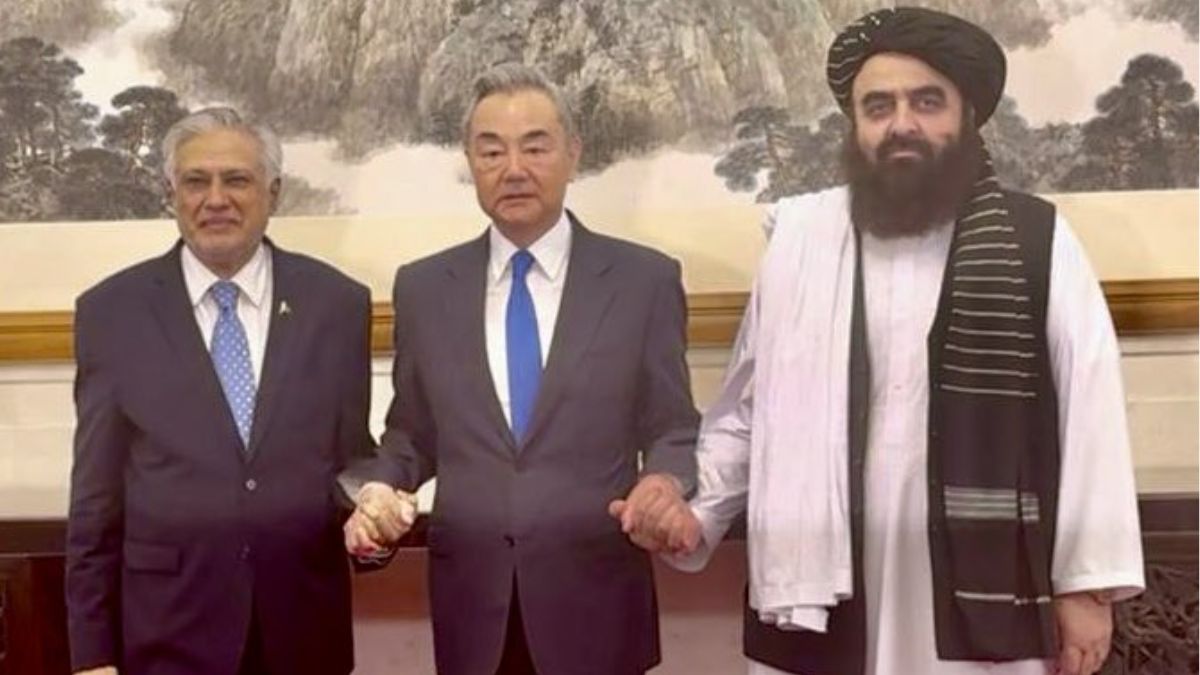Pakistan and Afghanistan have decided to enhance their diplomatic ties, China announced on Wednesday (May 21). The development came after Beijing hosted an “informal” meeting between Islamabad and the Afghan government led by the Taliban.
Chinese Foreign Minister Wang Yi held talks with his Pakistani counterpart Ishaq Dar and Afghanistan’s Acting Foreign Minister Amir Khan Muttaqi, with the three leaders deciding to extend the China-Pakistan Economic Corridor (CPEC) to Afghanistan. This comes as a big worry for New Delhi, which has objected to the connectivity project as it violates India’s sovereignty and territorial integrity.
As China meddles to bring Pakistan and Afghanistan closer amid tensions, here’s why India won’t be happy.
Pakistan, Afghanistan to step up ties, says China
China said that Pakistan and Afghanistan “clearly expressed” their willingness to upgrade their diplomatic ties.
The two countries “agreed in principle” to send ambassadors to each other’s countries soon, Reuters reported, citing Chinese Foreign Minister Wang.
“China welcomes this and is willing to continue providing assistance for the improvement of Afghanistan-Pakistan relations,” he said, according to a Chinese foreign ministry statement.
Sharing a picture with Wang and Muttaqi, Pakistan’s Dar, who is also the Deputy Prime Minister, wrote on X, “Pakistan, China, and Afghanistan stand together for regional peace, stability, and development.”
The meeting came during Dar’s three-day visit to China, the first such high-level interaction since Indian strikes hit nine terror sites in Pakistan and Pakistan-occupied Kashmir (PoK) under Operation Sindoor.
A statement said that Afghanistan’s acting foreign minister “emphasised the importance of political and economic relations with both countries and expressed hope for further progress in these areas in the future.”
China, Pakistan and Afghanistan have also decided to hold a trilateral foreign ministers’ dialogue in Kabul as soon as possible.
According to Wang, Beijing and Islamabad also backed the reconstruction and development of Afghanistan, along with ramping up trade exchanges with the Taliban-ruled country.
“The meeting also agreed on security cooperation, combating terrorist forces and safeguarding regional peace and stability,” the Chinese foreign minister reportedly said.
As per PTI, Pakistan’s Foreign Office said that three countries reiterated trilateral cooperation to boost regional security and economic connectivity. “They discussed enhancing diplomatic engagement, strengthening communications, and taking practical steps to boost trade, infrastructure, and development as key drivers of shared prosperity,” it said.
“They agreed to deepen Belt and Road Initiative (BRI) cooperation and extend the China-Pakistan Economic Corridor (CPEC) to Afghanistan,” the statement added.
The thaw matters as the ties between Pakistan and Afghanistan frayed after the Taliban’s Kabul takeover. Islamabad accuses the Tehreek-e-Taliban Pakistan (TTP) of using Afghan soil to launch attacks on Pakistan, a charge rejected by Kabul.
Wang also separately met with Muttaqi in Beijing on Wednesday.
As per a Deccan Herald (DH) report, the Afghanistan acting foreign minister told the Chinese FM that the Taliban government gave weight to Beijing’s security concerns and would never allow “any force” to use Afghan soil to partake in activities that endanger China.
What is CPEC?
CPEC is an ambitious project that aims to connect China’s Xinjiang province to Gwadar Port in Pakistan’s Balochistan province through roads, railways, and energy projects.
The $46 billion infrastructure project, launched in 2015, has increased to over $62 billion in investments.
The much-hyped CPEC, a 3000-km-long connectivity project, is touted as a means to accelerate Pakistan’s fragile economy and give China direct access to the Arabian Sea.
Why CPEC’s extension is a worry for India
India is opposed to CPEC, a flagship project under China’s Belt and Road Initiative (BRI), as it passes through Pakistan-occupied Kashmir (PoK).
As India considers PoK a part of its territory, it argues the project violates its sovereignty and territorial integrity.
There are also concerns in New Delhi about China gaining ground in South Asia through infrastructure and military cooperation with India’s neighbouring countries, as per a Moneycontrol report.
Beijing investing in infrastructure in PoK and Balochistan under CPEC is a red flag for India, as it could pave the way for greater military mobility for Pakistan and China in the region.
New Delhi also fears that CPEC could hurt its own regional connectivity projects, such as the Chabahar port in Iran, by creating alternative trade routes that bypass India, as per the business news outlet’s report.
With CPEC’s likely expansion to Afghanistan, India would be keenly watching as the development raises its security and economic concerns.
One of the biggest worries for New Delhi would be Pakistan using Afghan territory to carry out anti-India activities. Afghanistan once housed Jaish-e-Mohammed and Lashkar-e-Taiba terrorists. With China backing Pakistan during Operation Sindoor, this trilateral bonding could “fund, train, and export terrorism into Indian territory,” reported Moneycontrol.
The extension of CPEC to Afghanistan could be a “symbolic snub” to India’s rising regional assertiveness, China signalling its support for “ironclad friend” Pakistan, and forestalling India’s growing ties with Central Asian nations, the report added.
New Delhi has previously condemned China and Pakistan for trying to lure third countries into the CPEC projects. “We have seen reports on encouraging proposed participation of third countries in so-called CPEC projects. Any such actions by any party directly infringe on India’s sovereignty and territorial integrity. India firmly and consistently opposes projects in the so-called CPEC, which are in Indian territory that has been illegally occupied by Pakistan,” India’s Ministry of External Affairs (MEA) had said in 2022.
The “informal trilateral meeting” also came against the backdrop of New Delhi elevating its engagement with Kabul to the ministerial level.
India has the edge over Pakistan as it has increased its engagement with the Taliban regime in Afghanistan. However, with China entering the field to improve Islamabad’s relationship with Kabul, New Delhi may need to re-examine its regional strategies.
With inputs from agencies


)

)
)
)
)
)
)
)
)



